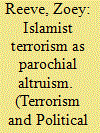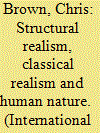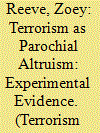|
|
|
Sort Order |
|
|
|
Items / Page
|
|
|
|
|
|
|
| Srl | Item |
| 1 |
ID:
157469


|
|
|
|
|
| Summary/Abstract |
Peace and global security are human endeavors, and thus their attainment depends as much on psychology as it does on governance and technology. In this paper I outline 3 ways our evolved psychology is an obstacle to achieving international cooperation and peace. First, humans show strong evidence of adaptations for cooperation within groups, but equally clear evidence that this cooperative nature does not extend to members of other groups. Second, humans evolved to have a relative sense of fairness, and thus will often reject even mutually beneficial agreements if they benefit others more than themselves. Third, humans evolved to be self-deceptive and hypocritical, believing in the unique righteousness and inevitable victory of their own cause, which tends to exacerbate conflict. Nevertheless, these obstacles are not insurmountable and an awareness of them can help in the development of strategies to increase the chances of lasting peace and security.
|
|
|
|
|
|
|
|
|
|
|
|
|
|
|
|
| 2 |
ID:
108940


|
|
|
|
|
| Publication |
2011.
|
| Summary/Abstract |
For decades deterrence has been understood to depend largely on psychology-convincing an adversary that certain actions are not in the adversary's best interests. However, beyond a token mention, contemporary discussions of deterrence seldom examine further the role of psychology and brain function in human decision making in matters of war and violence. Instead, deterrence planners typically rely on the rational actor model as a convenient simplifying assumption. The rational actor model itself is comprised of corollary assumptions that do not comport with scientific findings or empirical evidence from historical studies. This article examines the development of the human brain, human cognition (the process of knowing), and relevant findings from the field of evolutionary psychology, as well as various factors that affect brain function and decision making. The discussion herein of psychology, human cognition, and deterrence suggests the inadequacy of the rational actor model for deterrence planning and offers a few useful guidelines as an alternative.
|
|
|
|
|
|
|
|
|
|
|
|
|
|
|
|
| 3 |
ID:
172169


|
|
|
|
|
| Summary/Abstract |
An evolutionary approach is used to explain how certain universal cognitive mechanisms (parochial altruism) underlie engagement and involvement in Islamist terrorism. Parochial altruism is the tendency to perceive and behave in ways that favour ingroups and disfavour outgroups in light of particular intergroup cues, whilst incurring some kind of personal cost to effect that bias. The parochial altruism mechanism influences how ingroups and outgroups are perceived (i.e., as threatened or threatening) and responded to. Experience of certain situations and/or dispositions (i.e., priming contexts of disease, and harm to the ingroup) make parochial altruistic responses more likely. It is argued that Islamist terrorist grievances can be considered as perceptions of evolutionarily relevant threats, whilst terrorism itself is an example of parochial altruistic behaviour. It is further proposed that features associated with engagement in terrorism (including exposure to ideology, propaganda, socialisation, etc.) enhance and guide parochial altruism, that is, perceptions of intergroup threat, and violent responses to it.
|
|
|
|
|
|
|
|
|
|
|
|
|
|
|
|
| 4 |
ID:
090147


|
|
|
|
|
| Publication |
2009.
|
| Summary/Abstract |
Kenneth Waltz's Theory of International Politics is a modern classic, and deserves to be read the way classic texts ought to be read, i.e. in context and in its own terms. Recovering the context in this case is difficult because of the changes in the discourse since 1979, but one difference between the contemporary and the current reception of the text does seem clear - Waltzian structural realism (or neorealism) is now, but was not then, seen as breaking with the traditions of classical realism. How is this discontinuity to be understood? Part of the answer lies in the rhetoric employed by participants in this debate, but, more substantively, there is a genuine disagreement between neorealism and classical realism over the role played by human nature in international relations. Waltzian neorealism appears, contrary to the tradition, to reject any major role for human nature, describing theories that emphasise this notion as `reductionist'; however, on closer examination, the picture is less clear-cut. Waltz's account of human nature can be related quite closely to the major strands in the realist genealogy, but at a tangent to them. Interestingly, and perhaps unexpectedly, it is also compatible with at least some of the findings of contemporary evolutionary psychology.
|
|
|
|
|
|
|
|
|
|
|
|
|
|
|
|
| 5 |
ID:
183028


|
|
|
|
|
| Summary/Abstract |
Drawing on the evolutionary approach, this paper proposes that certain universal cognitive mechanisms (parochial altruism) underlie engagement and involvement in terrorism. Parochial altruism is the tendency to perceive and behave in ways that favour ingroups and disfavour outgroups in light of particular intergroup cues, whilst incurring some kind of personal cost in order to effect that bias. New data is generated by implementing an experiment and using a student sample to investigate certain features of parochial altruism. Findings indicate that sensitivity to parochial altruism varies across individuals, according to sex, group size, and feelings of vulnerability. Some individuals are more sensitive to perceiving and responding to threatening outgroups, which is relevant to the radicalisation process. It is proposed that in certain conditions, such as the presence of radicalisation risk factors, those most sensitive to parochial altruism may be more open to perceptions of threat to the ingroup, extremist ideology, and more likely to engage in violent actions than others.
|
|
|
|
|
|
|
|
|
|
|
|
|
|
|
|
|
|
|
|
|